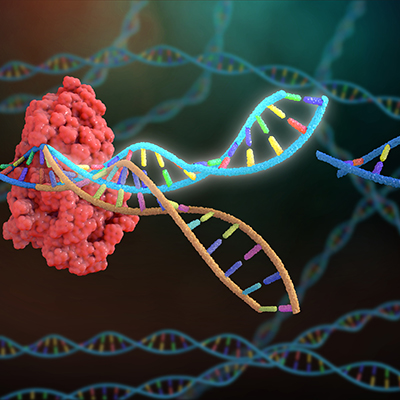October 13, 2022 -- Using a CRISPR-Cas9 screen, researchers at St. Jude Children’s Research Hospital have generated insights into the switch from fetal to adult hemoglobin that suggest a new approach for treating beta hemoglobinopathies such as sickle cell disease.
During fetal development, the hemoglobin gamma-globin subunit gene is expressed. The gamma-globin protein combines with alpha-globin to form fetal hemoglobin, the main oxygen carrier during gestation and at birth. Around birth, globin expression in human red blood cells shifts from gamma- to beta-globin, causing the gradual replacement of fetal hemoglobin by adult hemoglobin.
Evidence that persistent expression of fetal hemoglobin alleviates the symptoms of sickle cell disease and beta-thalassemia, a related beta hemoglobinopathy, has driven interest in the switch from gamma- to beta-globin gene expression. The evidence suggests reversing the switch could treat the diseases.
In an October 12 article published in the journal Nature, St. Jude researchers describe their work to shed light on the expression switch. The scientists ran a CRISPR-Cas9 screen for ubiquitin-proteasome components that regulate the expression of fetal hemoglobin. Through their work, the team showed that depletion of an enzyme stabilized its target and thereby induced gamma-globin gene transcription.
The finding led to further studies of the target, namely hypoxia-inducible factor 1-alpha (HIF1-alpha), and ways to use it to induce expression of fetal hemoglobin. The researchers found that low blood oxygen, also known as hypoxia, and the inhibition of prolyl hydroxylase domain enzymes that target HIF1-alpha for ubiquitination cause similar induction of fetal hemoglobin.
Companies have already developed proline hydroxylase inhibitors for the treatment of anemia linked to chronic kidney disease. Roxadustat has won approval in markets such as China and the European Union, although it and a similar drug, vadadustat, were rejected by regulators in the U.S. amid safety concerns. A U.S. decision on a third drug in the class, daprodustat, is scheduled for early next year.
While the U.S. rejections complicate the situation, the presence of several molecules that have completed clinical development and come to market in multiple territories could accelerate the translation of the Nature discoveries into new treatments for beta hemoglobinopathies. Dr.Mitchell Weiss, PhD, St. Jude hematology department chair and corresponding author on the paper, outlined the opportunity.
"Our findings indicate that proline hydroxylase inhibitors might be useful for treatment of sickle cell disease or beta-thalassemia, where turning on [fetal hemoglobin] production has therapeutic benefits. Approximately 20% of adult sickle cell disease patients develop kidney failure with related anemia. Proline hydroxylase inhibitors might serve a dual purpose in these individuals, by stimulating the production of both erythropoietin and [fetal hemoglobin]," Weiss said in a statement.
Copyright © 2022 scienceboard.net









